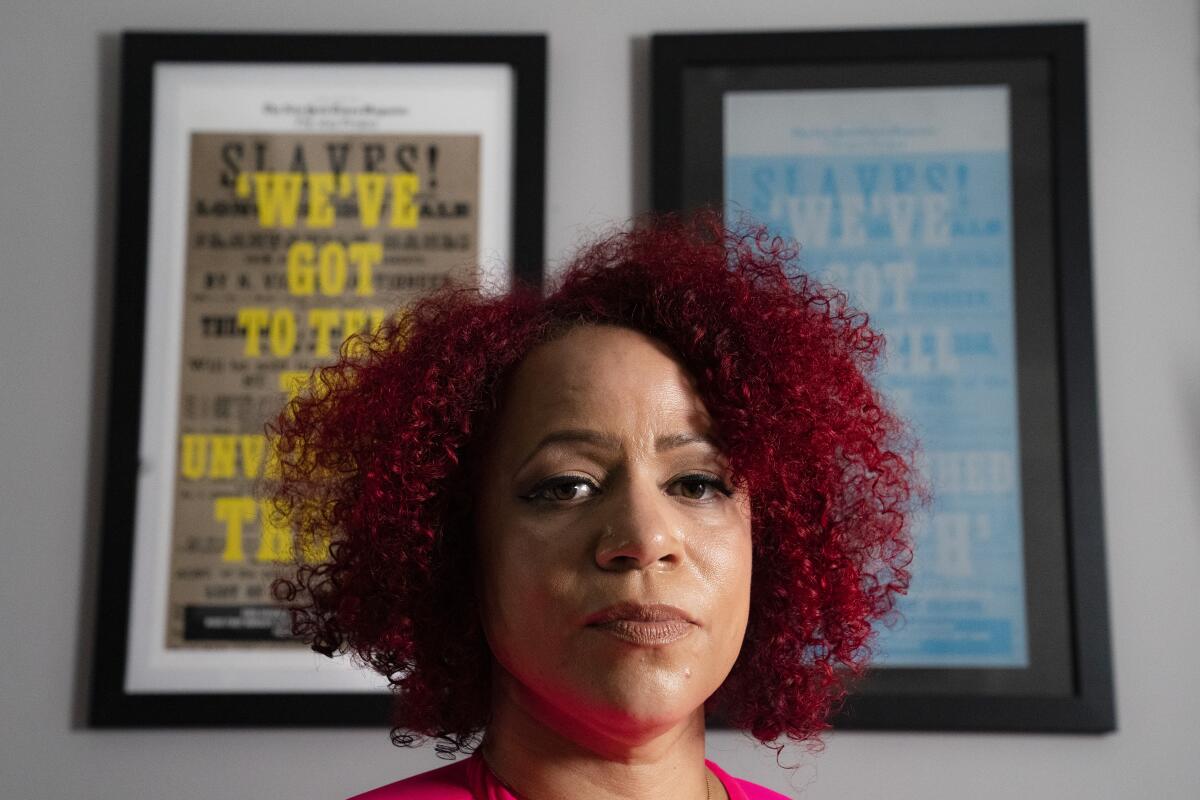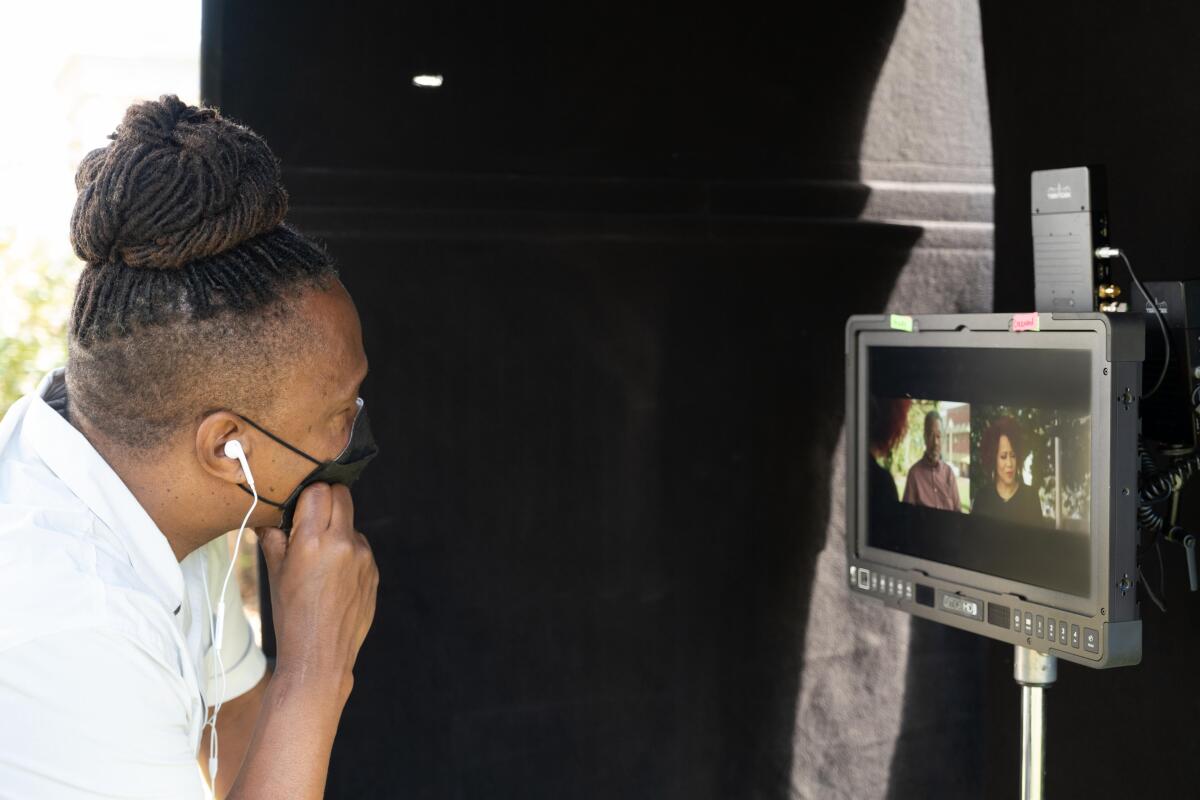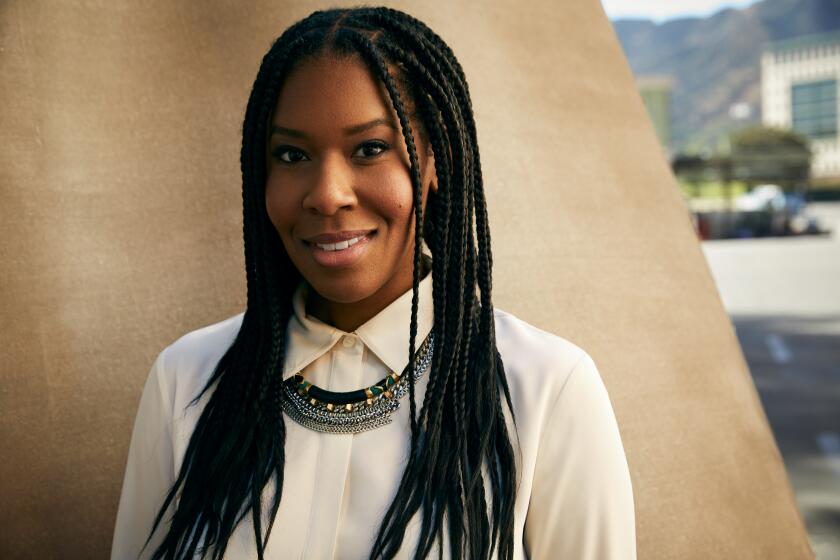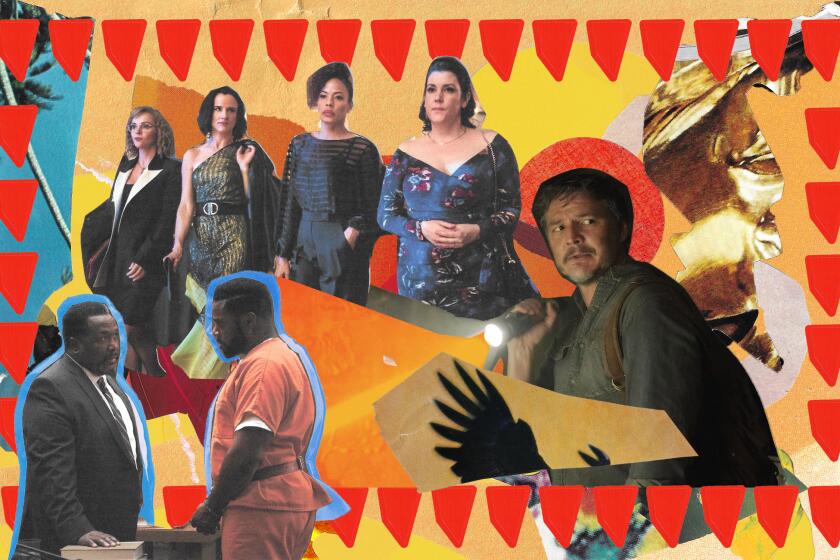Why ‘The 1619 Project’ creator is ‘proud’ to have ‘enemies’ in Donald Trump, Ron DeSantis

When “The 1619 Project” was released 3½ years ago, the ambitious reexamination of American history sparked difficult conversations about the legacy of slavery in the United States and earned praise for its creator, New York Times Magazine writer Nikole Hannah-Jones.
It also provoked a fierce, if predictable, backlash from critics, many of whom were threatened by its central thesis: that the arrival of the first enslaved Africans in Virginia 400 years ago was a defining moment — perhaps the defining moment — in the history of the United States, one that continues to have a real and frequently devastating effect on Black Americans today.
“The 1619 Project,” which was first published as a collection of essays in the New York Times Magazine, then adapted into a podcast and a book, also attracted attention from Hollywood producers interested in making it into a documentary.
Though she hadn’t originally imagined this possibility, Hannah-Jones has always been an enthusiastic consumer of historical documentaries and understood the power of bringing the multimedia project to a wider audience. In particular, “Eyes on the Prize,” the landmark 14-part series about the civil rights movement, “was transformative for me,” she says in a video chat from her Brooklyn apartment. “I can’t tell you how many times I watched that documentary.”
“The 1619 Project” has now arrived on Hulu as a docuseries, and while Hannah-Jones is reluctant to say the series emulates “Eyes on the Prize” — “There are certain things you don’t emulate” — it offers a similarly compelling look at the deep roots of racial injustice in America.
Each of the six episodes, like the essays on which they are based, considers a current phenomenon — voter disenfranchisement, Black maternal health, the racial wealth gap — and traces it back to the history of slavery and segregation in the United States, drawing powerful and often unexpected connections between past and present.
The series also weaves in details about Hannah-Jones’ family that vividly illustrate the project’s themes — her white grandparents’ decision to disown their daughter for marrying a Black man; her Black grandmother’s journey during the Great Migration from the Mississippi Delta to a red-lined neighborhood in Waterloo, Iowa; her late father’s fierce patriotism and military service.
The series, produced by the Onyx Collective, a Disney-owned content brand highlighting the work of creators of color, is almost certain to provoke further consternation from voices on the right. But Hannah-Jones has no plans to back down, and is already eagerly thinking of ideas for a potential second season. “One thing about studying this history,” she says. “I’m just not ever going to be intimidated.”
Under the Disney umbrella, Onyx Collective — a new content brand that centers on creators of color — aims to expand the storytelling universe with a collection of top filmmakers.
How did you approach telling this story for TV and making it visually exciting and engaging but also informative?
That was a major challenge: How do you keep the story moving? How do you visually keep interest when there is a lot of dense history? When you’re reading the essays, you might read for a while, set them down and then come back. We had lots of conversations about how to breathe life into each episode. We really tried to personalize these sometimes abstract concepts through the lives and narratives of real people. And we also just tried to shoot it in a very visually appealing way. My model was Melina Matsoukas’ commercial for Beats by Dre [“You Love Me.”] I watched that commercial so many times. I was like, I don’t even know what the hell you’re selling, but this is amazing.
What was it like for you as a print journalist to step in front of the camera? Did you have to change your reporting process?
I’m used to it just being me, my iPhone, a pad and a pen. To invite people in to see my interview style, the way I ask questions — I felt very exposed. It’s really challenging to create intimacy with people when you’re asking them to share very traumatic experiences but there’s this whole crew around you. And right when you’re having that person-to-person moment, they’re like, “Cut, we have to change the battery.” I think the benefit of me not being a broadcaster is I really am just talking to people the way I talk to people when I report. But sitting there, watching myself on camera for hours and hours, was a new level of hell [laughs]. Why is my hair looking like that? Why did I ask the question that way? But at some point, I had to let that go.
Were there any moments in the process of making this that were particularly powerful for you? I am thinking of when you teared up while looking at the slave ledger.
That was a surprisingly emotional moment for me. I’ve studied this history for more than half of my life. I knew that these ledgers existed, but there was something about the combination of working on this project and being so immersed in this history every day for four years now and then holding the ledger in your hand, running your finger along the names and seeing human beings who could very well have been my direct ancestors listed beside farm implements and animals, and in some cases they’re more valuable than the human beings. Just thinking about my family, I was really overcome with emotion.
Also, interviewing Mr. MacArthur Cotton [a leader of the Student Nonviolent Coordinating Committee who was arrested for organizing a mass voter registration effort in 1963], in Greenwood, [Miss.], my dad’s hometown. We’re sitting right across from a Confederate monument. And right behind us is the courthouse where he was arrested for simply trying to exercise his rights to citizenship. He tells me the story of how he was tortured at Parchman prison, strung up by his wrists, left there to hang until he defecates all over himself. Just sitting there with him realizing how close this history is, and everything that he sacrificed for us, was deeply emotional.
And this didn’t make it in the documentary, but as we were filming, this guy comes up, wearing a Confederate hat. He sits on the monument and starts filming us. I’m like, “I don’t know what’s happening here.” So I started filming him back. Then he left. You realize there’s still danger out there.
What do you think it says about your work that it has been singled out by conservatives like former President Donald Trump and Florida Gov. Ron DeSantis?
It’s a great testament to the work. If the work was insignificant, powerful people wouldn’t be spending so much time trying to attack it and discredit me. Like most journalists, I got into the profession because I wanted to do work that had impact. There’s lots of ways to measure impact, but one might be who your enemies are. And what I know from studying the history of the Black press is that Black journalists who seek to critique the racial and economic hierarchies of the United States have always been targeted. I’m proud to take part in that tradition.
You have a great episode about Black music right in the middle of the series. Did you feel like you needed a subject that was more joyful and celebratory, to provide a bit of a breather?
The whole thing can’t just be pain and struggle. As Black people were fighting back against everything that we were going through, we were also living, loving and creating. What better vehicle to tell that story of the full breadth of human emotion than music? Even in the original project, the music essay [by Wesley Morris] was intended to give us a space to recognize Black joy, resilience and creativity. And it was essential in the documentary series. I don’t think the series is bingeable. Every episode is hard. You have to take time between them.

How do you approach criticism of the project and decide who to engage or not engage?
Two years ago, anybody who had anything to say about the project, I would engage. You could have 10 Twitter followers or 10,000, I didn’t care. I was really ready to brawl in the street. It was so personal to me. I really felt I had to be out there defending it. I can admit I felt wounded by some of the attacks, even though I shouldn’t have.
But I learned a lot over the last couple of years. A lot of the people who were attacking the project needed me to respond because me responding was how they fanned the flames. These days, I don’t respond to anything. As an Aries who likes to fight back, I didn’t realize how much satisfaction I could get by just ignoring people.
That being said, I do think it’s important to acknowledge that there was legitimate criticism of the project. I don’t have the hubris to think I’ve ever done any work that was perfect or above critique. History is a field of interpretation and different scholars can look at the same set of facts and come to different interpretations. And with some of [the criticism] we said, “You’re right. We should have been more careful here and provided more context.” We revised the book based on the good-faith critiques, and we certainly revised for the documentary series.
You mention in the first episode, “Democracy,” how your father flew the flag every day, and it confused you when you were young. Has this project helped you understand his version of patriotism?
Absolutely. The democracy essay for “The 1619 Project” [on which the episode is based] is the most patriotic thing I’ve ever done. I don’t think you can watch the democracy episode and not see it as patriotic. It’s not patriotic as defined by conservatives who think patriotism is performative — standing up for a flag or wearing a flag pin — but the highest calling of patriotism, which is to fight your country and force it to live up to its ideals. Black Americans have epitomized that.
Literally by working on this project, I came to understand that my father wasn’t flying that flag as a sign of his subjugation, which is what it felt like, but as a sign of his refusal to have his lineage and legacy be taken from him. As Black Americans, we literally have no other country to claim. We have been made to feel that we can’t really claim the country we played such a role in building, and my father refused to feel that. I’m not going to fly it personally, but we have a right to it. That essay — particularly the part about my dad flying the flag — is the thing that people across racial lines connect with the most.
The entertainment experts at The Times select the TV shows we’re most looking forward to this year.
Did including your family history in the series make you feel vulnerable?
It was [director and executive producer] Roger Ross Williams’ idea. It’s different to tell your own story in print than visually. That was when I felt most vulnerable. Understanding the type of vitriol that you face, the ugly things that people say online — unless you’ve been in the storm of “The 1619 Project,” I don’t think you can really understand what that’s like. I’ve chosen this profession, so I have to deal with it, but to invite my family [into that], I was really worried. But they were so proud to be able to share their story and represent Black Americans and the common struggle.
The other hard part was being honest about my grandparents. My grandparents were very good to me and my sisters, but also they were racist. Even though they loved us, they would make comments about other Black people. They disowned my mom when she married my father. I had to spend a lot of time thinking about if I wanted to put that in the documentary. Ultimately, I felt like we ask people to do this for us all the time as journalists, so I had to be honest.
In the final episode of the series, you make a powerful argument for reparations. How hopeful are you that this might happen in your lifetime?
I try to never predict the future. But I would say we are closer to it than I think we’ve ever been, outside of a brief period during Reconstruction when a small number of Black Americans got access to land. We’ve never seen communities starting to take reparations as an issue seriously, like the state of California is doing, like Evanston [Ill.] and Asheville [N.C.] are doing. It has never been treated as a more serious issue. We are about to get an hour to make that argument on [Hulu parent company] Disney, right?
In general, I am not a hopeful person. But as a student of history, I also know that you have to imagine the world even if you don’t know that you will ever live to see it. Frederick Douglass had to believe that slavery could end, even though there was no reason to think we would go to war to end it. Fannie Lou Hamer had to believe that racial apartheid in this country would end, even though there was no reason for her to think that it would. I certainly didn’t think I would live to see a Black president in my lifetime, and it happened when I wasn’t even old. I do know that the impossible can be made manifest.
‘The 1619 Project’
Where: Hulu
When: Any time
Rating: TV-MA (may be unsuitable for children under the age of 17)
More to Read
The complete guide to home viewing
Get Screen Gab for everything about the TV shows and streaming movies everyone’s talking about.
You may occasionally receive promotional content from the Los Angeles Times.








